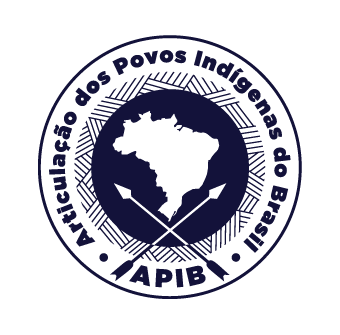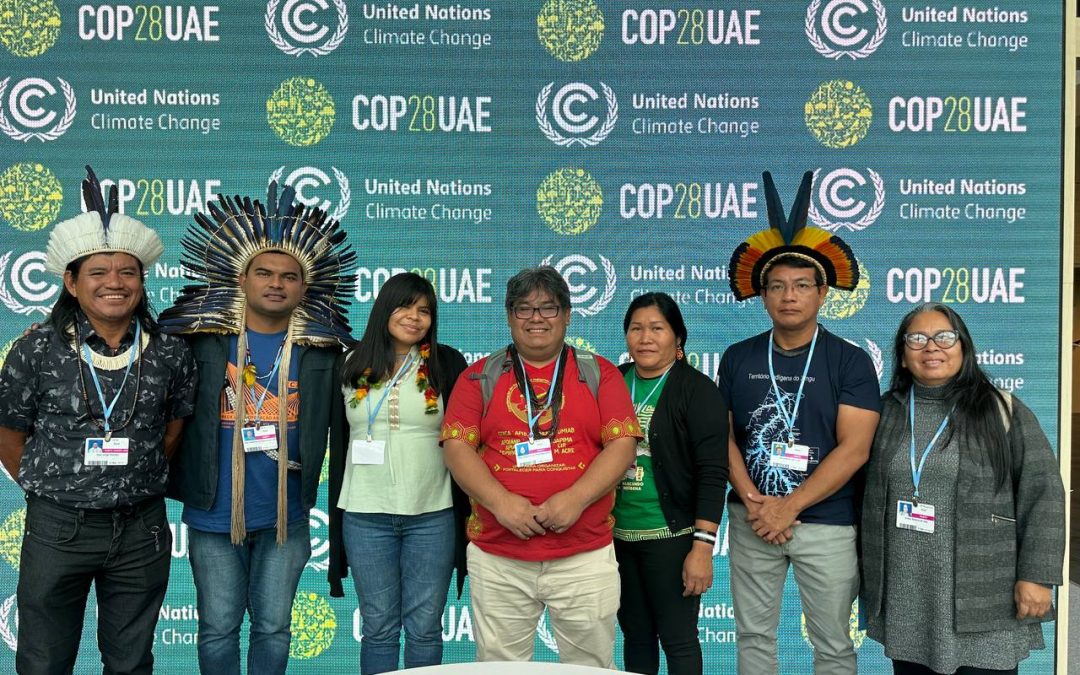fotos: Kaianaku Kamaiura (@kaianakukamaiura)
Amid growing concern over the destruction of forests and other critical ecosystems, Indigenous leaders representing the Articulation of Indigenous Peoples of Brazil (Apib), Brazil’s national indigenous mobilization, convene an urgent press conference to brief audiences on legal efforts led by Brazil’s conservative, bolsonarist congress to further roll-back the rights of Indigenous Peoples and local communities and make any progress under the current administration void and null.
On May 30, Brazil’s House of Representatives approved a bill (PL490) that would limit the recognition and demarcation of Indigenous territories to only those that were occupied by indigenous communities on October 5, 1988, the date of enactment of the Brazilian Constitution. According to Indigenous leaders with APIB and their legal counsel, this bill–named the Marco Temporal law–is unconstitutional as it ignores the fact that due to centuries of persecution and extermination, many Indigenous communities were expelled from their ancestral territories. THe bill has been approved by the lower house and is set to be deliberated by the senate in the coming week. If approved, the law would also strip the newly-reinstated Environment and Indigenous Peoples Ministries of some powers, weakening their oversight of environmental protections and the demarcation of Indigenous lands.
The press conference is scheduled to take place on Tuesday, June 6, 2023, one day before Brazil’s Federal Supreme Court (STF) is expected to resume their judgment of Marco Temporal as it relates to the case of the Xokleng Indigenous People who anxiously await a decision that could expand their rights to 37,000 hectares of their ancestral lands.
WHO:
Toya Manchineri, General Coordinator of the Coordinator of Indigenous Organizations of the Brazilian Amazon (COIAB). He belongs to the Manchineri people, from the state of Acre, and is a member of the Indigenous Climate Change Committee (CIMC), and the Technical Chamber on Climate Change of the PNGATI Steering Committee. For two years, he participated as one of the civil society representatives in the National REDD+ Commission, representing the Articulation of Indigenous Peoples of Brazil (Apib).
Cassimiro Tapeba, Executive Coordinator to the Articulation of the Indigenous Peoples and Organizations of the Northeast, Minas Gerais and Espirito Santo (APOINME). He belongs to the Tapeba people of Brazil, and holds a degree in Agricultural and Environmental Engineering.
Eliane Xunakalo, From the Kurâ Bakairi people she is the Coordinator of FEPOIMT (Federation of Indigenous Peoples and Organizations of Mato Grosso). She was the first indigenous woman of her people to graduate with a Bachelor’s degree in Law, to do a post-graduate course in Public Administration. For more than 10 years she have been fighting for representation in politics, society, academia and culture, being a member of the Academy of Arts, Sciences and Letters of Brazil (ACILBRAS) and having received several public honors, including by the Legislative Assembly of Mato Grosso (ALMT).
Sineia Wapichana, is an environmental manager, coordinator of the Environmental Management Department of the Indigenous Council of Roraima (CIR), Brazil and was the coordinator of the Technical Chamber of Climate Change of the PNGATI Steering Committee. For over 10 years, she has followed the climate discussions at the regional, national and international levels of the UNFCCC, focused on the indigenous agenda and the implementation of actions at the local level.Environmental Manager of CIR (Indigenous Council of Roraima)
WHAT:
A hybrid press briefing to lay out how PL490 bill and the Marco Temporal legal thesis will affect the rights of millions of indigenous Brazilians who await the formal demarcation of their ancestral lands, on which they depend for food, water, shelter, and cultural survival. Beyond directly impacting the lives of indigenous peoples from Brazil, those proposals would also affect Brazil’s ability to comply with its Nationally Determined Contributions (NDCs) and thus, the global effort to mitigate climate change.
WHEN: Tuesday, June 6, 2023, at 16:30-17:00 CEST // 10:30 – 11:00 EST // 11:30 – 12:30 BRT.
WHERE: The press briefing — which will also be available via Zoom — will take place in Bonn, Platz d. Vereinten Nationen 2, 53113, Nairobi 4 building, press conference room. If you are based in Bonn and would like to attend in person, or request the Zoom details, RSVP with Karina Melo at +55 11 95296-9032.
MORE INFORMATION
Lula’s victory fueled global hope that Brazil–the world’s most biodiverse country–would lead global efforts to protect nature and fight climate change and biodiversity loss after four years of Bolsonaro’s destructive government that led to a surge of violent invasions, land grabbing, and illegal natural resource extraction in the Amazon rainforest and other biodiverse ecosystems.
In his first few months in office, Lula reinstated Brazil’s Environment Ministry, created a new Indigenous Ministry led by one of the country’s most renown indigenous activists, Sonia Guajajara, and announced the titling of six new indigenous territories.
However, according to experts, if the PL490 bill passes and Brazil’s Supreme Court recognizes the Marco Temporal legal thesis, it could tarnish Lula da Silva’s progress and climate ambitions. “If Lula loses this battle in Congress, it will represent yet another political defeat for his administration and display the conservative force he faces,” Bruna Santos, director of the Wilson Center’s Brazil Institute, told CNN in a story published after Brazil’s congressional vote on PL490 which passed by 283 votes to 155.
About the Articulation of Indigenous Peoples of Brazil (APIB)
APIB is the largest Indigenous organization in Brazil and has, since its creation, fulfilled its commitment to fight for the constitutional rights of the country’s Indigenous Peoples. Whether nationally or internationally, APIB and its seven grassroots organizations are mobilized to protect territories, communities and people.
The Indigenous Peoples, articulated through their regional organizations and APIB, seek in all instances the accountability of those responsible for this destruction. APIB has historically mobilized the indigenous movement and faced the anti-indigenous policies that are being processed in the Federal Supreme Court and in the Chamber of Deputies, forming the front line of protection of Indigenous Peoples and Lands, and consequently, of the environment and the environment’s future.
APIB is working on multiple fronts to stop these attacks against their rights and territories. They are in Bonn, Germany to raise international alerts; they are working hand and hand with government officials who care for the climate and human rights and organizing nation-wide demonstrations.
For more information please look here and visit APIB’s website.

